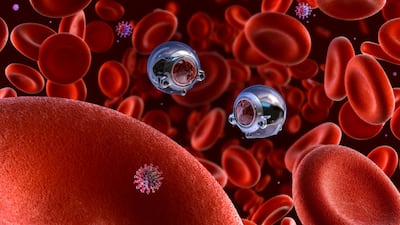Nanotechnology
The traditional method of performing conventional lab diagnostic testing, using blood draws and waiting often long periods for the results, presents challenges for clinicians dealing with complex medical conditions. Continuous diagnostic monitoring based on real-time molecular sensing is the long-awaited solution.
SoundCell BV and Applied Nanolayers are using genetically engineered E.Coli contained in a graphene chip to test for antibiotic resistance.
Three diagnostics that detect COVID-19 as well as the flu got regulatory authorization this week. Meanwhile, Skipjack’s COVID-19 test recall was designated class I; a new collaboration to promote nanoparticle engineering was launched; and an FDA guidance document discusses long-term safety for products used in newborns.
The standard helps developers determine whether their products might exude harmful amounts of nitric oxide.
Medtronic said its next-generation InterStim Micro system for overactive bladder has been implanted in the first patient in the ELITE study, which seeks to evaluate the safety and performance of the US FDA-approved device. See what Keith Xavier, a founding partner at Urology Partners of North Texas who implanted the first patient, said about it here.
Medtronic’s next-generation InterStim Micro system for overactive bladder is more competitive with Axionics’ r-SNM system, according to an analyst. Medtronic continues to innovate as its former CEO announces retirement.
Big pharma’s consumer division launches partnership with tech company Luminostics.
Depending on the regulatory jurisdiction, Nanobiotix’s radiation-activated cancer nanotechnology may be a drug or a device. But regardless of classification, it offers a physical solution to problems that chemistry and biology cannot solve.
Industry groups AdvaMed and the Medical Device Manufacturers Association (MDMA) thanked the US Medicare agency CMS for its recent proposal to allow coverage for new breakthrough devices. But both said a CMS proposal for new technology add-on payments in fiscal year 2020 Inpatient Prospective Payment System (IPPS) rules to boost rates for new devices from 50% to 65%, should actually be an 80% increase.
Takeda continues to expand its interests in the gastrointestinal area through a joint research and development agreement with a small US venture for novel nanoparticle immune modulating therapies for celiac disease.
Starting out as a traditional Chinese medicine factory, China’s Luye Pharma is now betting on new formulations of best-selling CNS drugs and international partnerships to bolster the chances of reaching its goal of becoming a global top 100 pharma firm by 2020.
The year-old pan-European biotech is targeting advanced liver cancer, severe mucositis and the rare cancer, peripheral T-cell lymphoma, for its first products in the orphan oncology niche.









